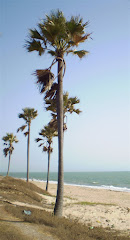Only my wall calendar quietly tells me that a mere ten days are left before the biggest holiday in the Western world. A hint of cold wakes me up in the mornings these days, and I linger in bed to enjoy it, knowing that even as I shiver to take my bucket bath at 9 a.m., the midday sun will still beat down in its dry December warmth. I consider my situation, my distance from where I call home, and think about how much I miss bitter cold, frost on the grass, icicles hanging from heavy tree branches, a cup of hot chocolate in my cold hands. I miss feeling the excitement of an upcoming vacation, as even if I leave my site over the holiday I will still be in Senegal, and still a Peace Corps Volunteer, doing my job 24 hours a day, 7 days a week. As I’ve pointed out before, this job is one that has no boundaries, no “quitting time”. Whenever I interact with a Senegalese person I’m doing one part of my job, so that’s pretty much most of my time…
Maybe you’ve noticed my tone is not an eager, enthusiastic one today. I admit it: I am tired. I have been working almost constantly over the last month, with a few short breaks for Thanksgiving and Tabaski, and juggling increasingly frequent thoughts about how to concentrate on my current work while considering wrapping up my time here. People are starting to ask what I will do “after”, and I am hoping in the next few weeks to have some down time to start thinking about that. I got nastily sick two days before our big International Day of the Volunteer event, though fortunately recovering quickly, but I think whatever it was weakened my system because two days after the weekend of the IDV to-do I came down with a cold that came on strong and has hung on for the past week.
Being sick has forced me to take things easier over the last few days, and fortunately the pace of work has also obligingly decelerated, with only one major project now demanding my attention for the next few weeks. Our three days of International Day of the Volunteer “celebrations” (December 4-6) went over remarkably well I’d say, considering my extensive pre-event worries, and the city pulled off hosting several hundred people with only some slight delays in food preparation and last-minute ceremony lineup rearrangements. After much fretting, the part of the ceremony planned for PCVs to “present their experience in community environmental management” ended up getting skipped, so the SED APCD (Small Enterprise Development Assistant Program Country Director) didn’t get to speak about Peace Corps’ role in starting the city’s now-famous pilot waste management project, nor did I have to take a turn at the podium in front of over 300 people to say my rehearsed Wolof proverb (as the APCD had asked me to do, as a concluding remark). Later on that day however the local radio rep cornered me to get my word on the event, so after not-so-eloquently expressing my feelings (in Wolof, of course) about the importance of recognizing volunteer work, I finished with the proverb I’d memorized for the occasion: “Benn lam ci loxo, keleng du am” - meaning “One single bracelet on a hand will not make a sound.”
It’s a truth universally acknowledged - it takes many to really make something happen. One person can set off a course of action, but without the domino effect of others reacting, that single person’s effort will have little meaning. As Peace Corps Volunteers, we are sent out to our villages and towns alone, single bracelets. But as time passes and we integrate into our communities, gain respect and press on in our task to reinforce local capacities, we gather more and more bracelets around us. My time here is waning and I may wonder how much I have actually accomplished, but I am not dreading leaving this work behind, because although I will eventually go back to the States in a few short months, I have hope that the loss of my single bracelet will not mean the silencing of the jangle I have endeavored to set in motion.


































